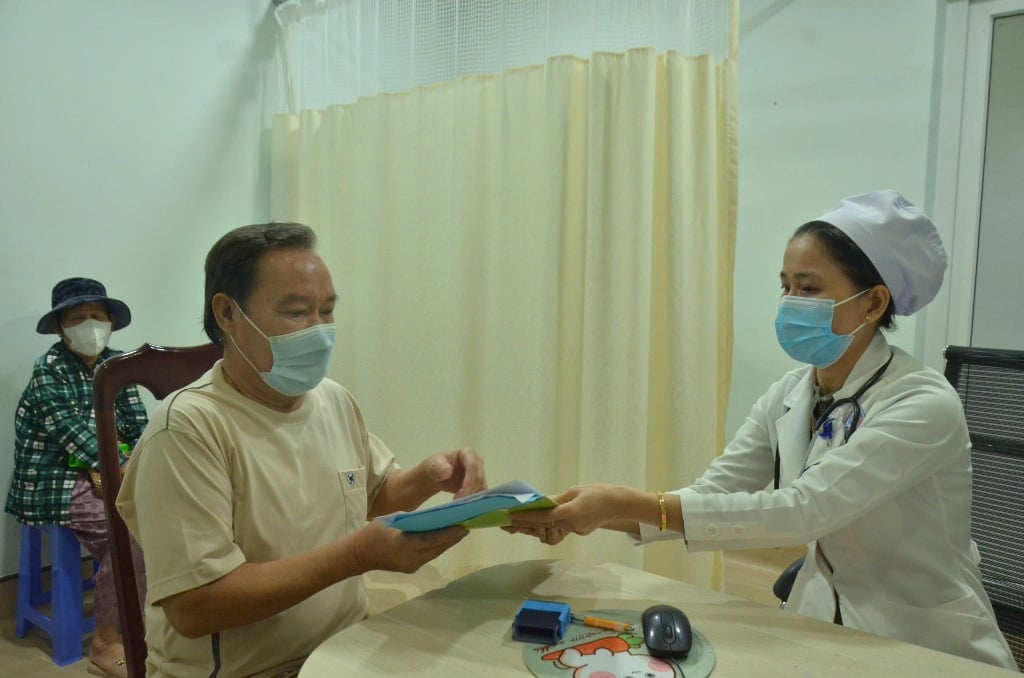The Ministry of Health has just issued Circular 26/2025/TT-BYT regulating prescriptions and prescriptions of pharmaceuticals and biological products in outpatient treatment at medical examination and treatment facilities. Clause 8, Article 6 of this Circular amends the regulations on the number of days of use of each drug in the prescription, including 252 types of diseases belonging to 16 groups of diseases that are prescribed for outpatient use for a maximum of 90 days depending on the clinical condition and stability of the patient. This adjustment of the regulation is to suit practical needs and reduce costs and procedures for patients.
For more than 10 years, Ms. Le Thi Nhung, 60 years old, residing in Vinh Thong ward, An Giang province, has been coming to Kien Giang General Hospital (old) to get medicine to take for 30 days/time due to diabetes and high blood pressure. “Every time I go for a check-up, I have to go very early, and after the examination, I can get the medicine by the morning. If I come late for the examination, I have to wait until the afternoon because there are many patients. Usually, I see the doctor asking if there are any unusual symptoms, otherwise the prescription is basically the same. This time for the check-up, the doctor said my health is stable, if needed, he can give me medicine to take for up to 60 days, I am very happy because I save money, time traveling and waiting for the examination,” Ms. Nhung said.
Patients come to Kien Giang General Hospital for examination
Living in Rach Gia ward ( An Giang province), Mr. Tran Hoang Nguyen shared: “I have had diabetes and cardiovascular disease for more than 10 years, so every month I go to the hospital for a check-up and get medicine. Although my house is not far from the hospital, due to the large number of patients, each time I have to wait in line for a long time. When the doctor examined me and assessed that my condition was stable, he could prescribe medicine for up to 90 days, I was very happy. In the past, I took the old prescription, my health was still stable, and I only had tests done once every 3-6 months.”
The list of 252 diseases that can be prescribed long-term medication includes not only common diseases such as high blood pressure, diabetes, asthma, anxiety disorders, depression, etc., but also many other diseases such as chronic hepatitis B, HIV/AIDS, breast cancer, thyroid cancer, hypothyroidism, pituitary failure, endocrine disorders; blood and immune diseases such as thalassemia, hemolytic anemia, amyotrophic lateral sclerosis, Parkinson's, Alzheimer's, dementia, etc.
According to Dr. Duong Ngoc Dinh, Head of the Examination Department, Kien Giang General Hospital, on average, the hospital receives and treats 1,500 - 2,000 patients per day, of which chronic diseases account for about 60% such as diabetes, hypertension, lipid disorders, etc. Therefore, prescribing long-term medication not only helps patients reduce inconvenience, save travel costs, especially patients living far from the hospital, the elderly, etc., but also reduces the burden on the hospital. From there, doctors have more time to examine and advise patients carefully.
However, the prescription of long-term medication is not applied widely, but the doctor must fully assess the clinical condition and predict a stable prognosis before prescribing medication for more than 30 days. Doctor Pham Thi Nhu Hanh, Department of Examination, Kien Giang General Hospital said: “When prescribing medication for 60 or 90 days, the doctor must consider carefully, depending on the patient's health condition. However, if the patient's condition is stable but still wants to return for a check-up after 30 days of taking the medication, the doctor will provide the medication according to the patient's request. At the same time, the doctor always advises the patient that in case the medication has not been used up but the patient has unusual signs, they can return for a check-up at any time to be evaluated and have the prescription adjusted when necessary."
Dr. Duong Ngoc Dinh said: “The Kien Giang General Hospital has been prescribing long-term medications during the COVID-19 pandemic, so the doctors in the examination department have experience in diagnosing and prescribing appropriate medications for each patient. Since July 1, the hospital has flexibly implemented Circular 26/2025/TT-BYT, ensuring the rights and health of patients.”
MINI
Source: https://baoangiang.com.vn/benh-nhan-phan-khoi-duoc-ke-don-thuoc-keo-dai-a423895.html












![[Podcast] No need to change passport or citizen identification when administrative boundaries change](https://vphoto.vietnam.vn/thumb/1200x675/vietnam/resource/IMAGE/2025/7/9/dfcd127b84b24a19a031801698c9a51f)






















































































Comment (0)